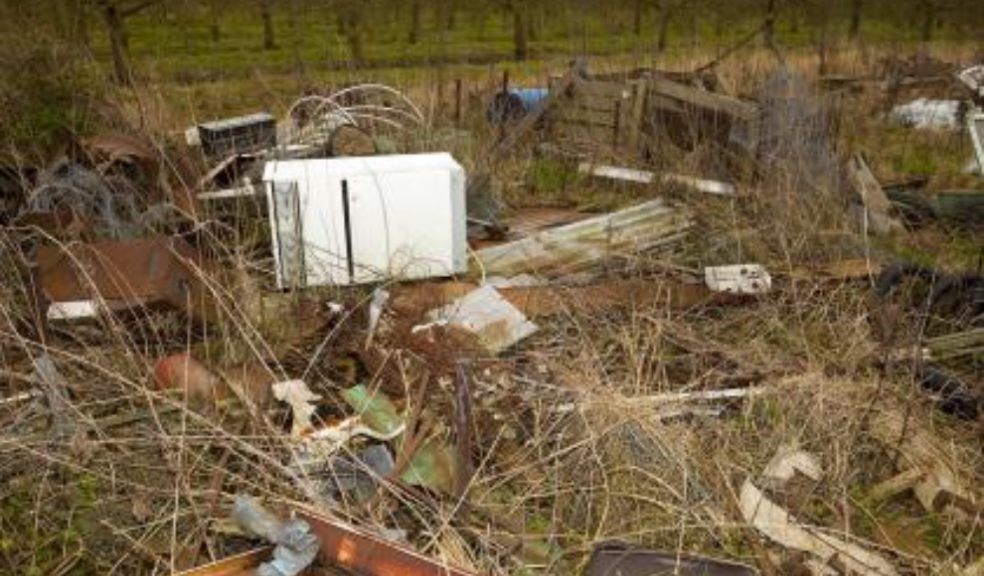
New partnership will clamp down on fly tipping and litter
Devon has launched a new multi-agency task force to combat fly tipping. Many of the county’s leading agencies will be working together in a crime-busting partnership known as the Clean Devon task force.
In a pioneering move designed to draw a line under fly tipping in Devon, Plymouth and Torbay, many of the county's leading agencies have come together to launch a new Clean Devon task force.
The partnership is sending a clear message to fly tippers that their behaviour will not be tolerated.
It brings together for the first time organisations from across Devon, including environmental and business groups, emergency services, government departments, local authorities, community groups and voluntary services, into a single partnership. (see Note to Editors)
It will provide a single, coordinated way of reporting fly tipping anywhere in the county, via its website https://cleandevon.org, as well as advice to residents, businesses and landowners about how to dispose of waste legally.
Partners will compile a fly tipping and litter data base, collate and share intelligence, and introduce the latest technology to help identify the culprits and seek to investigate and prosecute illegal behaviour.
It will also help identify high risk areas and enable each of the partners to target their resources better, to quickly clear up hot spots.
Kevin Baker, Environment Agency's Waste Crime Engagement Specialist, said:
"It's the shared determination shown by so many agencies in Devon to tackle fly tipping and general littering, that gives this partnership a new energy.
“We know that the Government plans to publish advice to encourage agencies to work together to tackle fly tipping and litter. We're ahead of that. Clean Devon partners have been meeting for a year."
Last year (2018/19) District Councils recorded 4,349 incidents of fly tipping in Devon - 12 incidents a day in Devon alone, excluding Plymouth and Torbay. They spent approximately £7 million on their street cleaning services, which includes dealing with fly tipping waste and litter.
But that's just part of the picture. Fly tipping onto privately owned land is not always recorded because it becomes the land owners' responsibility to clear it up, so the full impact in the county is not known.
Mr Baker said:
"Waste crime is estimated to cost the UK economy at least £600 million a year. It puts communities at risk and is an unacceptable blight on our environment. That's why we are working together to get on top of it.
"There is already a certain amount of intelligence sharing between the agencies and councils, but Clean Devon formalises the arrangements.
"If together we can stop waste getting into the hands of criminals then we can reduce their opportunity to illegally tip it.
"We also need more people to come forward and give detailed reports of those people who are illegally tipping. A reporting facility is available on the new Clean Devon website.
“Clean Devon will be good for residents and the environment, bad for the polluters and criminals who fly tip waste.”
Rangers for the Dartmoor National Park Authority say the moor suffers with fly tipped waste at least once a month. They say such incidents highlight the lack of respect offenders have for the environment, including nationally protected locations like Dartmoor National Park.
They've had to deal recently with fly tipped waste at Ramshorn Down, garden and builders waste dumped in a car park at Trendlebere Down, and large batteries thrown to roadside near Widecombe.
The Park Authority's Head of Recreation, Access & Estates Andrew Watson said:
“We are delighted to be part of the Clean Devon Partnership as fly tipping appears to becoming more commonplace within the National Park.
"Fly tipping is not only a blight on the protected landscape status of Dartmoor, it is bad for tourism and our local communities, as well as being a hazard to visitors, grazing livestock and wildlife.
"We are looking forward to even closer working with other agencies and organisations through this Partnership as another positive way of tackling rural crime.”
Working closer and sharing good practice between authorities is expected to tighten up enforcement actions.
Devon’s District Councils last year wrote warning letters to 213 people or businesses about fly tipping; they issued 47 fixed penalty notices for fly tipping-related incidents; and there were nine formal prosecutions resulting in fines of up to £1,000. The Environment Agency also brought several cases against large scale illegal tippers.
Councillor David Harvey, Chair of the Devon Authorities Strategic Waste Committee, said:
“We want to stop fly tipping and littering. Part of that is about education and providing advice about how to dispose of waste legally, but it also means identifying and penalising those who fly tip.
“Our residents expect us to be tough on fly tipping, and rightly so. Enforcement can be difficult because offences are often difficult to prove. But this new initiative will certainly help, and I very much welcome it.
“It will make it easier to report incidents as well as utilising the latest technology to share intelligence and get smarter in dealing with the culprits.”













